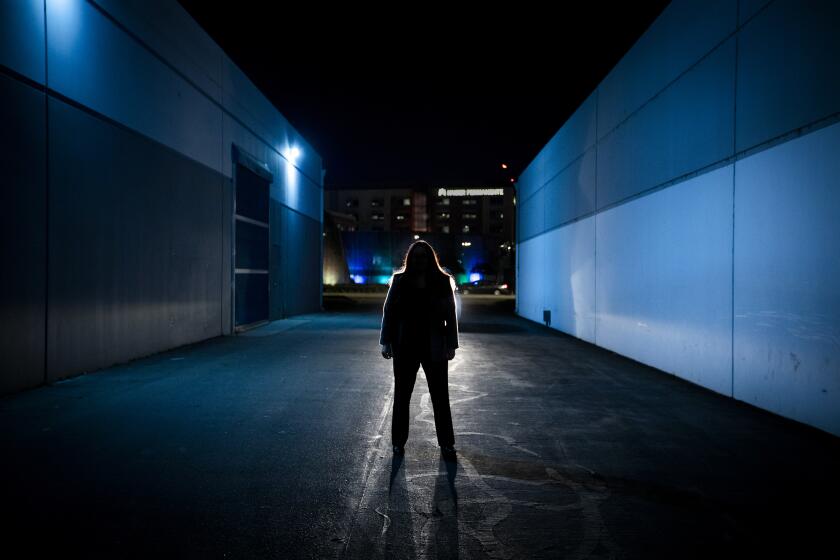A mother and daughter ‘kidnapped.’ A husband’s bizarre story. A baffling Irvine mystery
To Irvine detectives, Cheng Zhang’s story initially strained belief. His wife and 12-year-old stepdaughter were missing — kidnapped from their apartment, he claimed — and he had waited more than a week to report it.
Zhang, a 42-year-old Uber driver, said he had been knocked out by a stranger at his door with an unidentifiable mist. He cleaned blood from the carpet. He followed kidnappers’ instructions to behave as usual, posing as his missing wife on WeChat. He told his stepdaughter’s school that the missing seventh-grader was sick at home.
All of this helped to establish Zhang as Suspect No. 1 when he approached police on Dec. 2, 2019. Interrogating him for hours, police told him his story was impossible. Experience told detectives that a husband who killed his wife and stepdaughter was a far simpler and more believable scenario.
Irvine advertises itself as America’s safest midsize city, and for a year and a half its Police Department said little about the unsolved disappearances of 34-year-old Amber Aiaz and her daughter, Melissa Fu, a student at Rancho San Joaquin Middle School. A pair of bare-bones news releases generated few leads.

But now, after what they call an exhaustive investigation, including more than 40 hours of interviews with Zhang and a parallel investigation by the FBI, detectives say they have not been able to disprove Zhang’s bizarre account. Instead, police say, it has proved consistent on point after point.
“We have exhausted every lead that we have to try to tie him to this disappearance,” Irvine Police Det. Haldor Larum said Friday. “We have to be open to alternate possibilities.”
One theory: a “gone girl” scenario in which Aiaz fled with her daughter, for reasons unknown, to another city or country. But there are arguments against it.
The seventh-grader, who used to talk to her grandmother daily, has not contacted her since. Aiaz has not touched her bank accounts in America. Their passports were still at the apartment. The Chinese government says she hasn’t touched accounts in her native China, either, nor has she or her daughter entered the country since they vanished.
‘The Trials of Frank Carson’ is a true crime podcast about power, politics and law in California’s Central Valley. Carson was Stanislaus County’s most controversial defense attorney, a wizard with juries and a courtroom brawler with an unapologetically caustic style.
“At no point since their disappearance have they surfaced on any database,” said Irvine Police Detective Supervisor Mark Andreozzi. “It’s really hard to stay off the grid with a team of detectives and the FBI looking for you for this long.”
That makes another theory seem likelier by the day — that Aiaz and her stepdaughter are dead, the victims of an uncommonly efficient and sophisticated broad-daylight kidnapping that became a double homicide.
Tale of a shocking kidnapping
Zhang, who was never charged in the case, could not be reached for comment. Police say he now lives in Los Angeles and fears organized crime, which he blames for the kidnappings.
According to police reports and interviews with Irvine detectives, Zhang said it began with a knock on the door of his small apartment on Michelson Drive about 4:30 p.m. on Nov. 22, 2019.
Zhang was at home with his stepdaughter, he said. His wife was driving home from Las Vegas with a carload of fruit and fish they planned to sell at a local market.
By Zhang’s account, he answered the door to find a man and a woman he did not recognize. The woman held something in her right hand. He felt something wet and misty on his face and collapsed. He woke up on the dining room floor hours later and found blood stains on the carpet and a bloody handprint on the kitchen wall. His stepdaughter was gone. His wife, who should have been home by then, was gone too.
Zhang, a Chinese immigrant who speaks little English, said he found a handwritten note on white-lined paper in Chinese. It told him his wife and stepdaughter were OK, that they would be home in a few days. If you contact police, you won’t see them again, the note said. Clean the apartment. Act normal. We are watching you.
He found his wife’s Ford Explorer outside in its usual spot, with its expected freight of fruit and fish. He contacted buyers on WeChat and sold the food.
More from Christopher Goffard
In the days that followed, he would wake to find someone had slipped notes under his door. They repeated key themes: They are fine. You will see them soon. Clean the carpet. Tidy the house. Do as we say.
Zhang had the bloody patches of carpet cut out and replaced. He tried to remove the bloody handprint on the wall with bleach, then painted over it. He went to his stepdaughter’s school and lied that she was ill.
On Wednesday — five days after the disappearances — he received a fifth note. It reassured him that his wife and stepdaughter were OK but instructed him to leave town for two days. He drove to Las Vegas and stayed with a relative and returned two days later to find a sixth and final note. They are fine. Clean the carpet again. Clean the house again. You will see them Monday.
When they did not appear, Zhang said, he decided to call police, who noticed that he was conspicuously nervous that he might be seen talking to them. He insisted on spending the night on a couch at the police station, rather than return home.
Zhang said he did not know who had kidnapped his wife and stepdaughter or why — there had been no demand for ransom money — but he was afraid the kidnappers were watching him.
‘The story seemed very impossible’
“I informed Zhang that the story seemed very impossible,” a detective wrote in a report. “He said he understood and said yes that it seems impossible but denied being involved in their disappearance or hurting them.”
Starting the day Zhang reported his wife and stepdaughter missing in December 2019, until mid-January 2020 — 44 days in all — dozens of detectives worked in shifts to surveil him around the clock.
Maybe he would meet with a co-conspirator or a paramour; maybe he would lead cops to the bodies. But his predictable routines suggested an existence of small compass.
He woke at 7 a.m. but rarely left his apartment, except for cigarette breaks on the patio. Investigators followed him by foot into the Zion Mart across the street, where he shopped. They followed him in an unmarked car when he jogged. During that time, Andreozzi said, “we never saw him do anything suspicious.”
People who knew Zhang described him to police as a nonassertive man who avoided conflict and typically acquiesced to his wife. Zhang said they married in 2017, broke up after he discovered she had an affair in China, then got together again.

It bolstered his credibility that he was “100% cooperative” with the investigation, Andreozzi said. “He would say, ‘What do you guys need?’ He has helped us find evidence that he destroyed.”
For instance, he let police search his apartment, directing them to the bloody handprint under the paint on the kitchen wall. Forensic techs found the replaced patches of carpet, peeled them up and found blood on the padding underneath. Tests led them to believe it was his wife’s blood.
Detectives interviewed Zhang’s neighbors at the sprawling Michelson Drive apartment complex. One had seen him carrying out a large cooler, another a large storage container. Had these contained the bodies, detectives wondered?
No, Zhang said — he was cleaning out his apartment.
What about the jagged cut near his left thumb, which had been conspicuous when police met him? He said his cleaver had slipped as he cut meat. He demonstrated with the knife, indicating the dull edge that caught him.
‘We can’t tie him to this’
One element of his story seemed, at first, easy to debunk — the “mystery spray” that he said had rendered him instantly unconscious.
“I’d never heard of a spray knocking someone out,” said Irvine police Det. Gavin Hudson. But the FBI said such substances did exist. One was an anesthetic called Fluothane, and its use suggested a kidnapping of unusual sophistication.
When a young woman’s body was found at a trash-sorting plant, Anaheim Police Department homicide Det. Julissa Trapp promises the victim’s mother she would find the killer.
Hudson interrogated Zhang in the company of Det. Victor Chang, who translated the Mandarin. Hudson said the turning point for him — the moment he began to seriously consider that Zhang might not be the culprit — was on Jan. 15, 2020.
He said Zhang came to the station and voluntarily answered questions from morning to midnight, while an FBI behaviorist studied him. Investigators surprised him with a request for a polygraph — he agreed immediately to take it, and showed no deception.
Through it all, Zhang’s account remained the same one he’d told for the last six weeks of interrogations. If it was all an elaborate lie, police said, it had been so flawlessly memorized that it would have challenged the memory of a professional actor, much less a seemingly simple man.
“He did not waver,” Hudson said. “We all came back and said, ‘We can’t tie him to this.’”
‘I can disappear’
Detectives think the solution may lie in Amber Aiaz’s past, in her history with men in Las Vegas or in China, or in what they believe were her habitual exaggerations about money.
According to police reports, she had convinced Zhang that she had millions of dollars in investments and hundreds of thousands in cash. Zhang reacted with disbelief when police showed him proof that his wife had been virtually broke.
“Amber told everybody in her life she had money,” Det. Larum said. And interviews suggested that she had angered people who felt she had swindled them. Some had even made threats. One theory is that kidnappers took her in the expectation that she would lead them to money she did not, in fact, possess.
Among the many puzzles is the dearth of tips the case has generated, despite the fact that the FBI put Aiaz and Fu on its “Most Wanted Kidnappings/Missing Persons” list. “In a year and a half, we’ve gotten just four tips,” Larum said.
Insisting on his innocence, Zhang made the point that if he had been involved in the kidnappings, there was no reason for him to report the crime at all. Police might not have learned about it without him.
“He said, ‘I’m a nobody in this country. I can disappear,’” Det. Chang said.
The FBI is offering a $10,000 reward for information that helps solve the crime. The tip line is (310) 477-6565.
More to Read
Sign up for Essential California
The most important California stories and recommendations in your inbox every morning.
You may occasionally receive promotional content from the Los Angeles Times.













